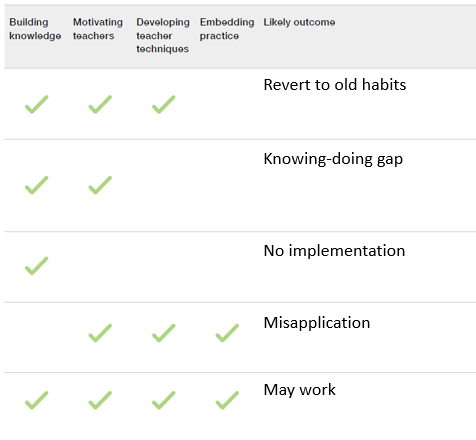Improving Teaching: new insight into how, right now

By Roger Higgins, Director of the Julian Teaching School Hub. Originally posted to the Norfolk Research School blog. Audio version available.
If you prefer, you can listen to this blog (AI generated text to speech):
School leaders would be forgiven for not reading blogs right now. For many, a wealth of issues including staff and pupil illness, and the return of full inspections, are dominating their thinking. Yet leaders also know that enabling effective classroom teaching is the ‘best bet’ in response to the Covid-19 pandemic.
Last year we wrote that improving teaching means prioritising teacher professional development, and that doing this well is tricky, whether ‘doing your own’ or buying in. Helpfully, the EEF has just produced a new guidance report on Teacher Professional Development with immediately actionable recommendations, one of which really stood out to me.
Recommendation 1: When designing or selecting professional development, focus on the mechanisms
Changing habits can be challenging, yet our profession necessitates us forming habits, whether helpful or unhelpful. Professional development must trigger and sustain a helpful change in behaviour in colleagues, in order to have a chance of benefiting pupils. Mechanisms are elements in a professional development programme which are causal in behaviour change. For example, revisiting prior learning with teachers is just as powerful as it is with pupils. This doesn’t need to be complicated: many schools already include quizzing and carefully structured peer discussion when designing professional development.
My initial reaction on seeing 14 separate mechanisms listed in the report was dread: who has time to read this right now? However, don’t be put off: the mechanisms fall into four groups, with the suggestion that we aim for at least one in each group when planning CPD:
- Building Knowledge
- Motivating Teachers
- Developing Techniques
- Embedding Practice
The report helpfully summarises the likely issues that could arise should we fail to achieve this, many of which resonate with my own past failures in the field of CPD design. For example, you might deliver high quality upfront training which builds teacher knowledge, motivates them to change practice, and models context-appropriate techniques. However, without a mechanism to follow up on this in order to embed the change in practice, teachers are likely to revert to old habits, despite good intentions.

The more mechanisms, the more likely professional development will impact pupils positively
This finding is potentially challenging for individual schools working to design their own CPD. While it seems intuitively right (a feeling not always correlated to research findings), as schools we have finite capacity which can cause us to make trade-offs. While the report points out that the actual content of CPD still matters a great deal to its impact, many schools understandably opt to invest in external CPD provision in order to provide the right mechanisms for sustained change.
Arm yourselves as critical consumers of professional development
With the Department for Education encouraging us to utilise external providers, whether for the Early Career Framework reforms, National Professional Qualifications or subject-specific development, schools may be feeling overwhelmed. How are we to select the best available options?
This is where the report’s list of mechanisms will really help. While ‘lots of mechanisms, please’ may be an unachievable ask at the moment for schools in terms of designing their own CPD, it seems only reasonable to expect this from CPD providers. I’d encourage schools to use the guidance and related tools from the EEF to really question offers and options before signing up to them. For example, the Early Career Framework’s laudable aim is to improve induction into, and retention within, our profession. We need to be critical consumers of the related programmes on offer to maximise the chances of this aim being achieved.
Regardless, leadership buy-in is the dealmaker or breaker
A research geek like me loves new terminology — yay mechanisms! For you, another buzzword may be a turn-off. Regardless, elsewhere in the report we find old truths that ring true. In particular, the report recommends that we need to implement professional development with care. It would be wonderful for schools right now if we could outsource this challenge, however the report makes little distinction here between internally and externally developed programmes. While we will inevitably seek to adapt programmes to suit our local contexts, if we omit the intended mechanisms then ‘common failures of CPD’ are likely to result.
Trying to trim the time spent on CPD (i.e. accelerate through or omit learning activities) is cited as the most common way in which schools adapt programmes. But while previous thinking about teacher CPD needing to last for two terms or more is now seen as less significant than effective use of time, we still need to invest sufficient time to understand a programme well. This lessens the risk of any adaptations negating the intended impact.
In other words, ‘free’ CPD may not equal a ‘free lunch’ unless we can actually commit to eating the food on offer.

